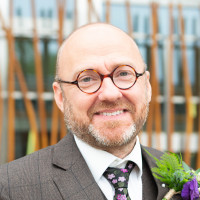Nobody should have been surprised by scenes at US. Capitol

It’s hard to know where to start in response to this week’s events in the US. The scenes at the Capitol should have been shocking, of course. No doubt there are people who genuinely found it hard to believe what they were witnessing, and who perhaps feel more traumatised and insecure than they ever have about their political system. But in truth nobody should have been surprised, either at what happened or at the underlying issues it exposed. And nobody here should comfort themselves with the idea that those issues are uniquely American.
Perhaps the most impressive response has come from many Black Lives Matter activists, using the slogan “We’re not asking you to shoot them like you shoot us, we’re asking you to not shoot us like you don’t shoot them”. It would be all too easy to look at the violent attempt to overthrow democracy, and to seek a response in kind. But ongoing escalation can only lead us to an even worse position than the one Trump has brought about.
It’s important to distinguish between those who have deliberately cultivated this situation - not just Trump himself and his inner circle, but those who have facilitated him, enabled him, legitimised him and built a movement around him - and others who have been swept along, subjected to a barrage of disinformation and conspiracy theory, their vulnerabilities exploited and their legitimate grievances weaponised. It’s also important to look back to see how this toxic movement took root, rather than only looking at its violent expression this week.
We can all name some of the worst culprits. Trump and many of his family and business cronies. Steve Bannon. Nigel Farage. Many other names leap to mind. It’s not just the political and media figures of the ‘fringe’ far right though - the same values permeate mainstream outlets like the Murdoch empire, and in this country publications like the Mail and the Spectator. The billionaire press are as culpable as any Breitbart hack.
And I struggle to find words for the contempt I feel for the politicians who’re busy denouncing Trump now, after he has lost an election and just days before he leaves office, but who feted him and boosted him for years before. That goes for the likes of Mitch McConnell in the US, but also for people like Michael Gove and Boris Johnson at UK level, but there are a fair few Scottish politicians in this category too. There’s Murdo Fraser, who as a Holyrood committee convenor bounced MSPs into calling the notorious climate denier Trump as a witness on, of all things, renewable energy. And of course we mustn’t forget the tawdry scenes of both Jack McConnell and Alex Salmond each using their position as First Minister to court the business of a man they already knew to be a racist, a liar, a conspiracy pedlar and a notoriously untrustworthy, bullying property developer.
But these political and media figures, culpable as they are, sit in a different category to the many victims of online radicalisation which the Trump movement and its merchants of grift have brought about.
I hope Trump and those who enabled him get what’s coming to them - political and legal accountability and the prospect of jail time. I hope the US can look forward to some kind of recovery from the disease, of which Trump was only the most obvious symptom. But if we’re to guard against the same disease developing here, we need to look at how it took root. There are too many disturbing parallels to allow any complacency.
Conspiracy theories like climate denial don’t have the same political space here that they do in the US, but they are by no means absent, as anyone can see from the abuse that many of the youth climate strikers have been subjected to.
The UK remains in deep denial about its own white supremacist history, and the racist backlash against Black Lives Matter and the drenching of the Edward Coulston statue exposed this. Scotland is also often guilty of denial about its role in imperialism. And while both unionism and independence are capable of being expressed without nationalist exceptionalism, you don’t have to look far to see it in part of both movements. We need the courage to self-reflect on this, instead of pretending it’s not there.
And the growth of movements which demonise marginalised groups and misrepresent their equal rights as a threat to others is far from unknown here either - just a few years ago political transphobia and the call for ‘bathroom bills’ to exclude trans people from public spaces was a source of dismay from progressives looking at the US. Now, it has embedded itself within the media and political parties in this country, another form of online populist radicalisation which Trump weaponised for his own ends.
If Trump was the symptom not the disease, we need to be fearless in identifying the symptoms afflicting our own political culture too, or we risk finding that it’s too late to stop the disease from taking hold.
This article was first published in The National on 8th January 2021.
